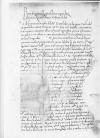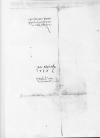Si non habet archetypum Paternitas Vestra, nihil est, quod nobis mittat iconium serenissimae filiae nostrae Isabella Jagiellon (*1519 – †1559), 1539-1559 Queen of Hungary; from 1539 wife of John Zápolya, King of Hungary, mother of John II Sigismund Zápolya; daughter of Sigismund Jagiellon, King of Poland, and Bona Sforza⌊IsabellaeIsabella Jagiellon (*1519 – †1559), 1539-1559 Queen of Hungary; from 1539 wife of John Zápolya, King of Hungary, mother of John II Sigismund Zápolya; daughter of Sigismund Jagiellon, King of Poland, and Bona Sforza⌋, nos enim habere cupimus imaginem illius ad vivum expressam. Quam si nobis mittere non potest Paternitas Vestra, nolumus provulgari formam illius eiusmodi, quae a rei veritate longe absit.
De pecunia contributa in Royal Prussia (Prussia Regalis), region, part of Prussia annexed to the Kingdom of Poland in 1466 under the provisions of the Second Peace of Thorn⌊PrussiaeRoyal Prussia (Prussia Regalis), region, part of Prussia annexed to the Kingdom of Poland in 1466 under the provisions of the Second Peace of Thorn⌋ terris miramur Vestram Paternitatem pro paucorum potius libidine, quam pro sacrae Sigismund I Jagiellon (Zygmunt I) (*1467 – †1548), King of Poland and Grand Duke of Lithuania (1506-1548); Duke of Głogów (Glogau) (1499-1506), Duke of Opava (1501-1506), Governor of Silesia (1504-1506); son of King Kazimierz IV Jagiellon and Elisabeth of Austria⌊maiestatis regiaeSigismund I Jagiellon (Zygmunt I) (*1467 – †1548), King of Poland and Grand Duke of Lithuania (1506-1548); Duke of Głogów (Glogau) (1499-1506), Duke of Opava (1501-1506), Governor of Silesia (1504-1506); son of King Kazimierz IV Jagiellon and Elisabeth of Austria⌋ dignitate statuere velle, quasi vero non aeque tuto deposita sit in phisco regio atque in Torunensi praetorio. Scilicet plus fidei habendum est Citizens of Thorn ⌊civibus TorunensibusCitizens of Thorn ⌋, quam sacrae Sigismund I Jagiellon (Zygmunt I) (*1467 – †1548), King of Poland and Grand Duke of Lithuania (1506-1548); Duke of Głogów (Glogau) (1499-1506), Duke of Opava (1501-1506), Governor of Silesia (1504-1506); son of King Kazimierz IV Jagiellon and Elisabeth of Austria⌊maiestati regiaeSigismund I Jagiellon (Zygmunt I) (*1467 – †1548), King of Poland and Grand Duke of Lithuania (1506-1548); Duke of Głogów (Glogau) (1499-1506), Duke of Opava (1501-1506), Governor of Silesia (1504-1506); son of King Kazimierz IV Jagiellon and Elisabeth of Austria⌋ in asservanda pecunia per incolas terrarum Royal Prussia (Prussia Regalis), region, part of Prussia annexed to the Kingdom of Poland in 1466 under the provisions of the Second Peace of Thorn⌊PrussiaeRoyal Prussia (Prussia Regalis), region, part of Prussia annexed to the Kingdom of Poland in 1466 under the provisions of the Second Peace of Thorn⌋ collata.
Reverendus dominus Piotr Tomicki (*1464 – †1535), humanist, statesman, diplomat, one of the most trusted collaborators of King Sigismund I of Poland; 1500-1503 Chancellor of Cardinal Fryderyk Jagiellon, 1502 Gniezno Cantor, Archdeacon of Cracow, 1503-1505 servant of Jan Lubrański, Bishop of Poznań, 1504-1510 Canon of Poznań, 1506 royal scribe, 1507-1519 Grand(?) Secretary, 1509 Canon of Włocławek, 1510-1514 - of Gniezno, 1511 Custos in Kielce and Sandomierz, 1514 Bishop of Przemyśl; 1515 Crown Vice-Chancellor, 1520 Bishop of Poznań, 1523 - of Cracow; from 1524 (at least) General Collector of świętopietrze (Peter's pence), 1509 royal envoy to the Dukes of Pomerania and to Mecklenburg, 1510 - to Wallachia, 1510, 1511, 1512, 1513 - to Hungary (WYCZAŃSKI 1990, p. 268)⌊Tomiczski PetrusPiotr Tomicki (*1464 – †1535), humanist, statesman, diplomat, one of the most trusted collaborators of King Sigismund I of Poland; 1500-1503 Chancellor of Cardinal Fryderyk Jagiellon, 1502 Gniezno Cantor, Archdeacon of Cracow, 1503-1505 servant of Jan Lubrański, Bishop of Poznań, 1504-1510 Canon of Poznań, 1506 royal scribe, 1507-1519 Grand(?) Secretary, 1509 Canon of Włocławek, 1510-1514 - of Gniezno, 1511 Custos in Kielce and Sandomierz, 1514 Bishop of Przemyśl; 1515 Crown Vice-Chancellor, 1520 Bishop of Poznań, 1523 - of Cracow; from 1524 (at least) General Collector of świętopietrze (Peter's pence), 1509 royal envoy to the Dukes of Pomerania and to Mecklenburg, 1510 - to Wallachia, 1510, 1511, 1512, 1513 - to Hungary (WYCZAŃSKI 1990, p. 268)⌋ et dominus Krzysztof Szydłowiecki (*1466 – †1532), one of the most trusted advisors of the King Sigismund I Jagiellon; 1497-1507 Marshal of the court of prince Sigismund Jagiellon, Cracow master of pantry; 1507-1510 court treasurer; 1509 castellan of Sandomierz; 1511 Vice-Chancellor of the Crown; 1515 - grand chancellor; 1515-1527 Voivode of Cracow; 1515 - Starost; 1527-1532 - Castellan⌊Cristophorus SchidlowieczskiKrzysztof Szydłowiecki (*1466 – †1532), one of the most trusted advisors of the King Sigismund I Jagiellon; 1497-1507 Marshal of the court of prince Sigismund Jagiellon, Cracow master of pantry; 1507-1510 court treasurer; 1509 castellan of Sandomierz; 1511 Vice-Chancellor of the Crown; 1515 - grand chancellor; 1515-1527 Voivode of Cracow; 1515 - Starost; 1527-1532 - Castellan⌋ viri fuerunt magno iudicio magnaque praediti prudentia. Piotr Tomicki (*1464 – †1535), humanist, statesman, diplomat, one of the most trusted collaborators of King Sigismund I of Poland; 1500-1503 Chancellor of Cardinal Fryderyk Jagiellon, 1502 Gniezno Cantor, Archdeacon of Cracow, 1503-1505 servant of Jan Lubrański, Bishop of Poznań, 1504-1510 Canon of Poznań, 1506 royal scribe, 1507-1519 Grand(?) Secretary, 1509 Canon of Włocławek, 1510-1514 - of Gniezno, 1511 Custos in Kielce and Sandomierz, 1514 Bishop of Przemyśl; 1515 Crown Vice-Chancellor, 1520 Bishop of Poznań, 1523 - of Cracow; from 1524 (at least) General Collector of świętopietrze (Peter's pence), 1509 royal envoy to the Dukes of Pomerania and to Mecklenburg, 1510 - to Wallachia, 1510, 1511, 1512, 1513 - to Hungary (WYCZAŃSKI 1990, p. 268)
Krzysztof Szydłowiecki (*1466 – †1532), one of the most trusted advisors of the King Sigismund I Jagiellon; 1497-1507 Marshal of the court of prince Sigismund Jagiellon, Cracow master of pantry; 1507-1510 court treasurer; 1509 castellan of Sandomierz; 1511 Vice-Chancellor of the Crown; 1515 - grand chancellor; 1515-1527 Voivode of Cracow; 1515 - Starost; 1527-1532 - Castellan⌊IiPiotr Tomicki (*1464 – †1535), humanist, statesman, diplomat, one of the most trusted collaborators of King Sigismund I of Poland; 1500-1503 Chancellor of Cardinal Fryderyk Jagiellon, 1502 Gniezno Cantor, Archdeacon of Cracow, 1503-1505 servant of Jan Lubrański, Bishop of Poznań, 1504-1510 Canon of Poznań, 1506 royal scribe, 1507-1519 Grand(?) Secretary, 1509 Canon of Włocławek, 1510-1514 - of Gniezno, 1511 Custos in Kielce and Sandomierz, 1514 Bishop of Przemyśl; 1515 Crown Vice-Chancellor, 1520 Bishop of Poznań, 1523 - of Cracow; from 1524 (at least) General Collector of świętopietrze (Peter's pence), 1509 royal envoy to the Dukes of Pomerania and to Mecklenburg, 1510 - to Wallachia, 1510, 1511, 1512, 1513 - to Hungary (WYCZAŃSKI 1990, p. 268)
Krzysztof Szydłowiecki (*1466 – †1532), one of the most trusted advisors of the King Sigismund I Jagiellon; 1497-1507 Marshal of the court of prince Sigismund Jagiellon, Cracow master of pantry; 1507-1510 court treasurer; 1509 castellan of Sandomierz; 1511 Vice-Chancellor of the Crown; 1515 - grand chancellor; 1515-1527 Voivode of Cracow; 1515 - Starost; 1527-1532 - Castellan⌋ non ignorabant, quid debeat interdum in terris Royal Prussia (Prussia Regalis), region, part of Prussia annexed to the Kingdom of Poland in 1466 under the provisions of the Second Peace of Thorn⌊PrussiaeRoyal Prussia (Prussia Regalis), region, part of Prussia annexed to the Kingdom of Poland in 1466 under the provisions of the Second Peace of Thorn⌋ et hic in Poland (Kingdom of Poland, Polonia)⌊regnoPoland (Kingdom of Poland, Polonia)⌋ Sigismund I Jagiellon (Zygmunt I) (*1467 – †1548), King of Poland and Grand Duke of Lithuania (1506-1548); Duke of Głogów (Glogau) (1499-1506), Duke of Opava (1501-1506), Governor of Silesia (1504-1506); son of King Kazimierz IV Jagiellon and Elisabeth of Austria⌊maiestatisSigismund I Jagiellon (Zygmunt I) (*1467 – †1548), King of Poland and Grand Duke of Lithuania (1506-1548); Duke of Głogów (Glogau) (1499-1506), Duke of Opava (1501-1506), Governor of Silesia (1504-1506); son of King Kazimierz IV Jagiellon and Elisabeth of Austria⌋ suae de contributione eiusmodi constitui.
Ceterum adduci numquam potuerunt maiorem ut eo or co⌈eoeo or co⌉... illegible⌈...... illegible⌉entionis or cutionis⌈entionisentionis or cutionis⌉ huius quod sacrae Sigismund I Jagiellon (Zygmunt I) (*1467 – †1548), King of Poland and Grand Duke of Lithuania (1506-1548); Duke of Głogów (Glogau) (1499-1506), Duke of Opava (1501-1506), Governor of Silesia (1504-1506); son of King Kazimierz IV Jagiellon and Elisabeth of Austria⌊maiestatis regiaeSigismund I Jagiellon (Zygmunt I) (*1467 – †1548), King of Poland and Grand Duke of Lithuania (1506-1548); Duke of Głogów (Glogau) (1499-1506), Duke of Opava (1501-1506), Governor of Silesia (1504-1506); son of King Kazimierz IV Jagiellon and Elisabeth of Austria⌋ dignitatis rationem haberent etiam(?) quicquid era(n)t id solius maiestatis eius beneficio s[...] paper damaged⌈[...][...] paper damaged⌉
esse [...] stain⌈[...][...] stain⌉ faceret Paternitas Vestra nostro iudicio si memor quod d[...] paper damaged⌈[...][...] paper damaged⌉ [...] stain⌈[...][...] stain⌉ virorum vestigia persequeretur atque [...] paper damaged⌈[...][...] paper damaged⌉ [...] stain⌈[...][...] stain⌉m libidini obsecundaret. Neque plu[...] paper damaged⌈[...][...] paper damaged⌉ [...] stain⌈[...][...] stain⌉ae Sigismund I Jagiellon (Zygmunt I) (*1467 – †1548), King of Poland and Grand Duke of Lithuania (1506-1548); Duke of Głogów (Glogau) (1499-1506), Duke of Opava (1501-1506), Governor of Silesia (1504-1506); son of King Kazimierz IV Jagiellon and Elisabeth of Austria⌊maiestatis regiaeSigismund I Jagiellon (Zygmunt I) (*1467 – †1548), King of Poland and Grand Duke of Lithuania (1506-1548); Duke of Głogów (Glogau) (1499-1506), Duke of Opava (1501-1506), Governor of Silesia (1504-1506); son of King Kazimierz IV Jagiellon and Elisabeth of Austria⌋, quae ita se gessit in [...] paper damaged⌈[...][...] paper damaged⌉ [...] stain⌈[...][...] stain⌉ aetatem suam, ut numquam quisquam [...] paper damaged⌈[...][...] paper damaged⌉ [...] stain⌈[...][...] stain⌉ non cupit pecunia illius publicae [...] paper damaged⌈[...][...] paper damaged⌉ [...] stain⌈[...][...] stain⌉tis aperte declaravit, tamen dolet [...] paper damaged⌈[...][...] paper damaged⌉ [...] stain⌈[...][...] stain⌉ quibusdam affici, ut ex arce illius a [...] paper damaged⌈[...][...] paper damaged⌉ [...] stain⌈[...][...] stain⌉ quasi fides ipsi non haberetur. Dece[...] paper damaged⌈[...][...] paper damaged⌉ [...] stain⌈[...][...] stain⌉ cuiusquam alterius rei sacrae Sigismund I Jagiellon (Zygmunt I) (*1467 – †1548), King of Poland and Grand Duke of Lithuania (1506-1548); Duke of Głogów (Glogau) (1499-1506), Duke of Opava (1501-1506), Governor of Silesia (1504-1506); son of King Kazimierz IV Jagiellon and Elisabeth of Austria⌊maiestatis regiaeSigismund I Jagiellon (Zygmunt I) (*1467 – †1548), King of Poland and Grand Duke of Lithuania (1506-1548); Duke of Głogów (Glogau) (1499-1506), Duke of Opava (1501-1506), Governor of Silesia (1504-1506); son of King Kazimierz IV Jagiellon and Elisabeth of Austria⌋ rationem paper damaged⌈[onem]onem paper damaged⌉ [...] paper damaged⌈[...][...] paper damaged⌉ dignitatis habeat atque illibatam illam conservare studeat.
De vaticinio domini Krzysztof Szydłowiecki (*1466 – †1532), one of the most trusted advisors of the King Sigismund I Jagiellon; 1497-1507 Marshal of the court of prince Sigismund Jagiellon, Cracow master of pantry; 1507-1510 court treasurer; 1509 castellan of Sandomierz; 1511 Vice-Chancellor of the Crown; 1515 - grand chancellor; 1515-1527 Voivode of Cracow; 1515 - Starost; 1527-1532 - Castellan⌊SchidlowiieczskiKrzysztof Szydłowiecki (*1466 – †1532), one of the most trusted advisors of the King Sigismund I Jagiellon; 1497-1507 Marshal of the court of prince Sigismund Jagiellon, Cracow master of pantry; 1507-1510 court treasurer; 1509 castellan of Sandomierz; 1511 Vice-Chancellor of the Crown; 1515 - grand chancellor; 1515-1527 Voivode of Cracow; 1515 - Starost; 1527-1532 - Castellan⌋ nullam in partem nunc disputamus. Cupimus id falsum esse, id quod cum in Paternitatis Vestrae manus positum sit. Horta text damaged⌈[a]a text damaged⌉mur illam, ut omnibus modis contendat et elaboret, ut Krzysztof Szydłowiecki (*1466 – †1532), one of the most trusted advisors of the King Sigismund I Jagiellon; 1497-1507 Marshal of the court of prince Sigismund Jagiellon, Cracow master of pantry; 1507-1510 court treasurer; 1509 castellan of Sandomierz; 1511 Vice-Chancellor of the Crown; 1515 - grand chancellor; 1515-1527 Voivode of Cracow; 1515 - Starost; 1527-1532 - Castellan⌊eumKrzysztof Szydłowiecki (*1466 – †1532), one of the most trusted advisors of the King Sigismund I Jagiellon; 1497-1507 Marshal of the court of prince Sigismund Jagiellon, Cracow master of pantry; 1507-1510 court treasurer; 1509 castellan of Sandomierz; 1511 Vice-Chancellor of the Crown; 1515 - grand chancellor; 1515-1527 Voivode of Cracow; 1515 - Starost; 1527-1532 - Castellan⌋ falso vaticinatum esse ostendat. Id quod tum faciet cum summum studium suum text damaged⌈[um]um text damaged⌉ et observantiam erga serenissimam Sigismund I Jagiellon (Zygmunt I) (*1467 – †1548), King of Poland and Grand Duke of Lithuania (1506-1548); Duke of Głogów (Glogau) (1499-1506), Duke of Opava (1501-1506), Governor of Silesia (1504-1506); son of King Kazimierz IV Jagiellon and Elisabeth of Austria⌊maiestatem regiamSigismund I Jagiellon (Zygmunt I) (*1467 – †1548), King of Poland and Grand Duke of Lithuania (1506-1548); Duke of Głogów (Glogau) (1499-1506), Duke of Opava (1501-1506), Governor of Silesia (1504-1506); son of King Kazimierz IV Jagiellon and Elisabeth of Austria⌋ dominum et benefactorem suum re declaraverit, ita ut illius gratiam rebus omnibus anteponat,  BCz, 2712, p. 44 sic et existimationi suae consulet et demerebitur eam sibi plurimum et ea apud Deum praemia consequetur, quae sunt posita iis, qui pro eo ac debent erga dominos summa sunt fide et observantia.
BCz, 2712, p. 44 sic et existimationi suae consulet et demerebitur eam sibi plurimum et ea apud Deum praemia consequetur, quae sunt posita iis, qui pro eo ac debent erga dominos summa sunt fide et observantia.
Bene et feliciter valere Paternitatem Vestram optamus.
 BCz, 2712, p. 44 sic et existimationi suae consulet et demerebitur eam sibi plurimum et ea apud Deum praemia consequetur, quae sunt posita iis, qui pro eo ac debent erga dominos summa sunt fide et observantia.
BCz, 2712, p. 44 sic et existimationi suae consulet et demerebitur eam sibi plurimum et ea apud Deum praemia consequetur, quae sunt posita iis, qui pro eo ac debent erga dominos summa sunt fide et observantia.


